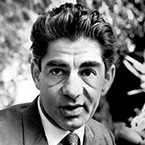
Jesse Leonard Steinfeld, MD, former U.S. surgeon general (1969-1973), died August 5, 2014, at the age of 87. Steinfeld, a 57-year emeritus member of the AACR, was an antitobacco crusader. He had served as deputy director of the National Cancer Institute (NCI) and deputy assistant secretary for Health and Scientific Affairs before being appointed surgeon general by President Richard M. Nixon.
Steinfeld began his tenure as surgeon general at a time when smoking was starting to become a major issue of public health. The first definitive, causal link between smoking and lung cancer was reported in 1964 in the landmark publication of the Surgeon General’s Report on Smoking and Health, which received widespread media coverage and marked the beginning of a significant shift in public attitudes about smoking.
Cigarette packs began carrying caution labels in 1965, alerting consumers that “cigarette smoking may be hazardous to your health.” In 1970, while Steinfeld was acting surgeon general, the labels began to carry a bolder warning: “The surgeon general has determined that cigarette smoking is dangerous to your health.”
Voicing his concerns over studies that found women were less likely than men to quit smoking, Steinfeld spoke out against the tobacco industry’s marketing toward women, and led a campaign to warn them that smoking is harmful not only to their own health, but that of their children and unborn fetuses. Additionally, he stressed the negative effects smoking had on one’s appearance, such as wrinkles and poor teeth.
Born Jan. 6, 1927, in West Aliquippa, Pennsylvania, to Jewish Hungarian immigrants, Steinfeld graduated from the University of Pittsburgh in 1945, 19 months after finishing high school at the age of 16. He received his medical degree from what is now Case Western Reserve University in Cleveland, in 1949, at the age of 22. Steinfeld completed an internship at what is now Cedars-Sinai Hospital in Los Angeles and residencies at the Veterans Affairs Hospital in Long Beach, California, and the Laboratory of Experimental Oncology at the University of California, San Francisco (UCSF) Hospital. Steinfeld had also served on the faculties of UCSF; George Washington University School of Medicine in Washington, D.C.; and the University of Southern California School of Medicine in Los Angeles. He had also served as physician aboard a Coast Guard ship in the North Atlantic during the Korean War.
Steinfeld was one of the first public health officials to sound an alarm on the effects of secondhand smoke. He hung signs in his office that read, “Thank you for not smoking,” and removed ashtrays. Some of his bold ideas, such as bans on smoking in public areas like airplanes, trains, and restaurants, took decades to come to fruition. A smoking ban on some domestic flights in the United States did not occur until 1988, for instance, after the fight against tobacco was stepped up in the 1980s by C. Everett Koop, who was surgeon general from 1982 to 1989.
Steinfeld offered his resignation as surgeon general in 1972 and stepped down from the position at the end of January 1973. Although many officials resigned during reshuffling following Nixon’s 1972 re-election, Steinfeld, who was lobbied against and named the “worst surgeon general ever” by the tobacco industry, said in an interview years later that he felt he was not able to keep his position because of his antismoking work. The surgeon general’s office was not filled again until President Jimmy Carter appointed Julius Richmond in 1977.
Steinfeld remained active in the campaign against smoking in the years following his role as surgeon general, however, as he re-entered academia. He went on to serve as director of the Mayo Clinic Comprehensive Cancer Center and professor of medicine at the Mayo Medical School in Rochester, Minnesota; professor of medicine at the University of California, Irvine, and chief of medicine at the Veterans Affairs Hospital in Long Beach; dean and professor of medicine at the Medical College of Virginia in Richmond; and president of the Medical College of Georgia in Augusta, a position he held until his retirement in 1987.
He had been a member of the AACR since 1956.
Be the first to add a Remembrance.